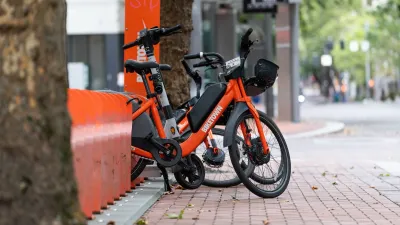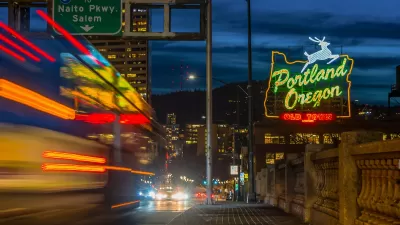Daniel Lerch, author of "Post Carbon Cities" presents his thoughts for a new California Dream in a 'post carbon future' in which cars still exist but are used sparingly due to urban planning that reduces their necessity. He looks toward Portland.
"For years we've tried to limit sprawl and promote transit, bicycling and walking – first in the name of conservation and quality of life, more recently to fight global warming. Today peak oil (the looming high point of global oil production) and the end of cheap oil make it more urgent than ever to reduce our dependence on cars.
There's a problem, though. We're stuck with the landscape we've built over the past 60 years, much of which is literally uninhabitable without a car.
This underlines an essential point for the real transportation future of California. The car will not disappear: It's simply too useful. But how we use cars, how we plan our economies and communities around cars and even how we build cars, all have to change.
California is already on the route toward breaking its ingrained car dependence with legislation like Senate Bill 375, which links energy use with transportation and land development. The challenges we face in global warming and declining oil supplies, however, require that we do more than just tinker around with zoning codes and transportation funding. We need to fundamentally rethink the way we do urban planning and the way we fund public infrastructure, and fast.
Portland, Ore., remains the best American example of this fundamental rethinking, with its vibrant downtown, pioneering light-rail system and strict constraints on suburban sprawl."
Thanks to MTC-ABAG Library
FULL STORY: The Conversation: How do we become less dependent?

Alabama: Trump Terminates Settlements for Black Communities Harmed By Raw Sewage
Trump deemed the landmark civil rights agreement “illegal DEI and environmental justice policy.”

Planetizen Federal Action Tracker
A weekly monitor of how Trump’s orders and actions are impacting planners and planning in America.

The 120 Year Old Tiny Home Villages That Sheltered San Francisco’s Earthquake Refugees
More than a century ago, San Francisco mobilized to house thousands of residents displaced by the 1906 earthquake. Could their strategy offer a model for the present?

Ken Jennings Launches Transit Web Series
The Jeopardy champ wants you to ride public transit.

BLM To Rescind Public Lands Rule
The change will downgrade conservation, once again putting federal land at risk for mining and other extractive uses.

Indy Neighborhood Group Builds Temporary Multi-Use Path
Community members, aided in part by funding from the city, repurposed a vehicle lane to create a protected bike and pedestrian path for the summer season.
Urban Design for Planners 1: Software Tools
This six-course series explores essential urban design concepts using open source software and equips planners with the tools they need to participate fully in the urban design process.
Planning for Universal Design
Learn the tools for implementing Universal Design in planning regulations.
Clanton & Associates, Inc.
Jessamine County Fiscal Court
Institute for Housing and Urban Development Studies (IHS)
City of Grandview
Harvard GSD Executive Education
Toledo-Lucas County Plan Commissions
Salt Lake City
NYU Wagner Graduate School of Public Service




























